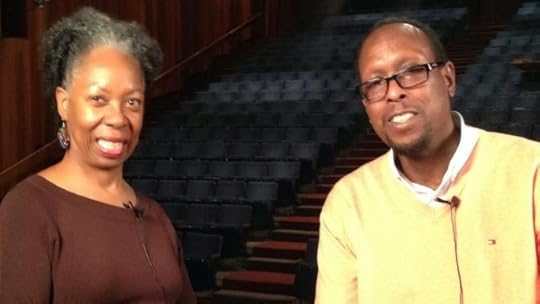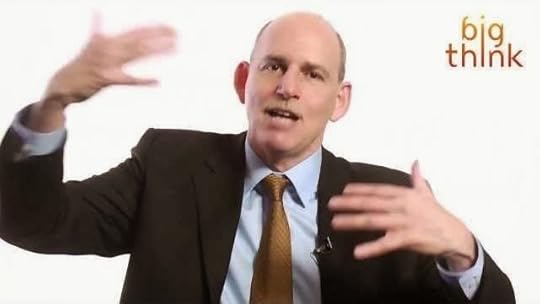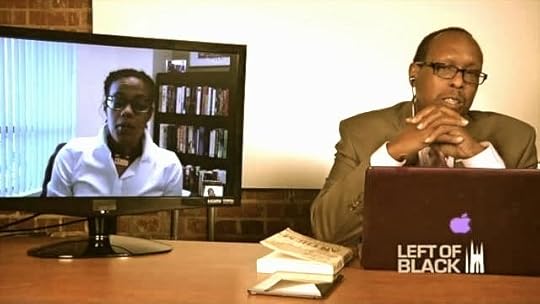Mark Anthony Neal's Blog, page 840
February 7, 2014
'Left of Black' Preview: How the Urban Bush Women Got Their Name
 The RootTV
The RootTVL
eft of Black host Mark Anthony Neal visits with Jawole Willa Jo Zollar in the Reynolds Industries Theater at Duke University. Zollar and her dance troupe, Urban Bush Women, are partaking in a two-week residency at Duke University. Urban Bush Women celebrates its 30th anniversary this year.
Published on February 07, 2014 06:41
February 6, 2014
Could A Smart Phone App Have Saved Trayvon?
Published on February 06, 2014 19:42
The Racist War on Drugs
 The Big Think
The Big ThinkEthan Nadlemann argues that the prohibition of countless drugs have consistently racist underpinnings. Nadelmann is the Executive Director for the Drug Policy Alliance.
Published on February 06, 2014 03:11
Were Super Bowl Ads Less Sexist This Year?
 The Representation Project
The Representation Project
A conversation with Kat Gordon and Rebecca Rivera of The 3% Percent Conference and Elizabeth Plank of +PolicyMic, looking back at gender representation in this year's Super Bowl ads and how social media played a role in changing the conversation. #notbuyingit #3percentsb #mediawelike
Published on February 06, 2014 03:04
February 5, 2014
Blank on Blank: Jimi Hendrix from 'The Final Interview'
 Blank on Blank
Blank on Blank"When things get too heavy just call me helium--the lightest known gas to man." - Jimi Hendrix
The final interview. London, 9/11/1970. Interview by Keith Altham
Published on February 05, 2014 10:07
February 4, 2014
One Month a Slave: The Case of Lewis Little
 One Month a Slave: The Case of Lewis Little
by Lamont Lilly | special to NewBlackMan (in Exile)
One Month a Slave: The Case of Lewis Little
by Lamont Lilly | special to NewBlackMan (in Exile)It was late evening July 15th, 2013 when 19 year old North Carolina Central University sophomore, Lewis James Little was finally released after a month of incarceration for a murder he did not commit. Several charges against Little including first degree burglary, first degree kidnapping, three counts of assault with a deadly weapon with intent to kill and felony conspiracy have all since been formally dismissed as an honest mistake. Lewis Little however, has been left to pick up the pieces of an experience truly worthy of a Lifetime Hardship Award.
On the evening of June 20th, 2013 Lewis Little and five of his friends left The Mews apartment complex to meet up and socialize with additional acquaintances at 414 Melbourne Street in northeast Durham. As they arrived by car, they spotted a body of an adult male lying in the street. After departing from their car, they approached the body “to find out why someone would just be laying in the street like that.”
Little and his friends were careful to observe without touching or disturbing what appeared to be a potential crime scene. After prompting the man to get up several times and inquiring about his safety without a response, Lewis Little called Durham police. The man on the ground was 25 year old Michael Lee, who was obviously in critical condition as he laid there wheezing his last few breaths. Worried and confused, Little and his friends stood beside Lee, as a small crowd of community members began to gather. Ironically, it was Lewis Little who suggested that he and his friends wait there for Durham police to arrive, since he was the one who called them.
When Durham police finally arrived, they attempted to gather information on what exactly had transpired. Lewis Little, his friends and several others were questioned about what they may have seen or heard. Shortly after, Lewis Little found himself singled out by Durham police officer, K. Hempstead and questioned more abrasively. Without explanation, Little was then informed that he was being detained for further questioning at the Durham Police Department’s 505 West Chapel Hill Street headquarter location. Officer K. Hempstead locked Little in handcuffs and placed him in the back seat of his police squad car. Little was taken to a Durham Police Department interrogation room and read his rights. Though investigators attempted to intimidate Little as they interrogated him, Lewis Little vehemently declared his innocence.
After hours of tedious questions and waiting in the interrogation room, Lewis Little was ordered to “strip down” and remove all articles of clothing in front of male and female officers. His keys, clothing, cell phone, shoes and watch were all confiscated. Little was outfitted in an oversized white paper jumpsuit. Investigators took fingerprints and DNA samples. Lewis Little sat there handcuffed to a steel chair until daylight the next morning. After the department’s morning shift change, he was taken to the Durham County Jail where news cameras and reporters were waiting to catch a glimpse of his face. allowscriptaccess="always" allownetworking="all" allowfullscreen="true" src="http://cdn.abclocal.go.com/static/fla... speaking with the magistrate, Little attempted to explain that there must be some mistake of identity. He informed the magistrate that he was the individual who initially called the police. He explained how he even waited with the body until police came. To no avail, Lewis Little was issued a $1,425,000 bond. He was booked, processed and outfitted from the paper jumpsuit he was wearing into a Durham County Jail orange one piece.
Officially an inmate, Little was taken upstairs to a section called “23 and 1,” where he was only allowed out for one hour a day to walk around indoors. He remained there for the entire weekend before being transferred to general population that Monday night. Unable to afford bond, Little was there for an entire month – no friends, no family, no campus activities or summer school classes.
While unjustly incarcerated for a series of crimes he did not commit, Lewis Little was only able to speak to a few people – his mother, the NAACP and his court appointed attorney, Alexander Charns. While Little sat incarcerated, the friends he was with the night they discovered the body, wrote statements on his behalf attesting his whereabouts. Little’s friend who resided across the street from where Michael Lee was killed had been living there for more than 15 years. Lewis Little had visited that home hundreds of times.
During Little’s one month jail stint, he was basically kept in limbo of how he had mysteriously been singled out and falsely apprehended. In a matter of minutes, Lewis Little went from calling the police to being arrested and stripped of his human rights. In the case of Lewis Little, here was a young man found guilty until proven innocent – no jury needed, only the police department.
To Little’s surprise one evening, he was informed by a correctional officer that he was being released in a few minutes and to gather his belongings. After a month of degradation, humiliation, slander and complete embarrassment, local college student, Lewis Little was finally released and greeted by a small group of close friends and family members. Little’s mother was informed that his $1,425,000 bond was officially recalled.
After his release, Little’s charges were dismissed. The District Attorney who presided over his case apologized for the inconvenience. The Durham Police Department offered no comment. Fortunately, Little’s release was just in time for the first semester of his sophomore year at North Carolina Central University, where Lewis Little is majoring in Mass Communications.
Prior to this humiliating debacle, Lewis Little had never been in any trouble with the law – no misdemeanors, no felonies, no nothing. He was a stellar student at Southern High School’s School of Engineering and has always been engaged in the community. Now, Little is having difficulty finding employment. Though his charges have been dismissed, they are still present on his record. Little’s classmates and professors are empathetic, but don’t know where to begin. “I’m still trying to get myself straight,” he said. “I was ordered to strip naked for crimes I did not commit. I walked into the Durham County Jail with no shoes on and metal shackles on my hands and feet. You never forget an experience like that.”
Little is also concerned about his reputation being destroyed. “You used to couldn’t google my name on the internet, now you can. According to the reports, I broke into someone’s home, kidnapped them and killed a man last year. And that’s not true at all,” Little said. “I’m a college student who looks forward to learning every day. Who’s going to repair my name? Who’s going to take my mug shot off the internet? This is not justice.”
Presently, Lewis Little is back in classes for the spring semester of his sophomore year. Five months after Little was wrongfully incarcerated for crimes he did not commit, the word of his horrific experience is just beginning to buzz around campus. Students are upset and have organized a small support group. Unfortunately, it looks like the Durham Police Department has done it again – more abuse and more brutality. No, Mr. Little, this is not justice. Maybe the Durham Police Department will make this right by sponsoring the remainder of your education. Then again, maybe not.
***
[Special Note – Please research the following names and their unfortunate contact with the Durham Police Department: Stephanie Nickerson (25), assaulted in 2012. Jose Ocampo (33), killed in 2013. Carlos Riley Jr. (21), framed in 2012. Derek Walker (26), killed in 2013. Jesus Huerta (17), killed in 2013. Protesters tear-gassed at vigil, December 2013.
Durham-based activist, Lamont Lilly is a contributing editor with the Triangle Free Press, Human Rights Delegate with Witness for Peace and organizer with Workers World Party. Follow him on Twitter @LamontLilly.
Published on February 04, 2014 22:05
Langston Hughes Poetry Reimagined On Singer Leyla McCalla's New Album
Published on February 04, 2014 21:40
Left of Black S4:E18: The Story Behind ‘We Shall Overcome’ and Other Anthems of Black Resistance
 Left of Black S4:E18: The Story Behind ‘We Shall Overcome’ and Other Anthems of Black Resistance
Left of Black S4:E18: The Story Behind ‘We Shall Overcome’ and Other Anthems of Black ResistanceLeft of Black host and Duke University Professor Mark Anthony Neal is joined via Skype by Professor Shana Redmond author of Anthem: Social Movements and the Sound of Solidarity in the African Diaspora (New York University Press). Redmond, a professor American Studies and Ethnicity at USC, examines the role of well known anthems of Black resistance including, “Lift Every Voice and Sing,” “To Be Young Gifted and Black” and “Nkosi Sikelel’ iAfrika.”Left of Black is a weekly Webcast hosted by Mark Anthony Neal and produced in collaboration with the John Hope Franklin Center at Duke University.
*** Episodes of Left of Black are also available for free download in @ iTunes U
***
Follow Left of Black on Twitter: @LeftofBlackFollow Mark Anthony Neal on Twitter: @NewBlackMan Follow Shana L. Redmond on Twitter: @ShanaRedmond
Published on February 04, 2014 04:25
February 3, 2014
Speakers for the Dead by Karla FC Holloway
 Speakers for the Dead
by Karla FC Holloway | special to NewBlackMan (in Exile)
Speakers for the Dead
by Karla FC Holloway | special to NewBlackMan (in Exile)“Who’s got the body?” That’s the question that opened my book on death and dying in African America—Passed On: African American Mourning Stories.We are asking which funeral home has the responsibilities for servicing the family’s grief. But it is also a question that lingers in ways that matter around our vulnerabilities at that moment—not only the substantial financial costs and stakes, but the corporeal—what it is “we” mean by death.
Two recent tragedies have unfolded: one in Texas and another in California around a woman and a child. Both are minorities. Their incapacities led to their family’s struggles to have a voice that would be heard, one that fundamentally and absolutely represented their authority and autonomy amidst the cacophony of legal decisions and medical expertise ready and willing to regulate what would happen once the bodies of their loved ones ceased independent functioning.
But these families had no way of intervention that might determine the outcome. Others held prevailing legal and medical authorities to determine the ways and means of their beloved’s separation from the technologies that eerily mocked some semblance of life. And as much as it was the horror of circumstance that led them to this precipice—the consequential battleground became a public and private terror. None of the legalisms or—in my judgment—punitive efforts to force some version of medical literacy onto families whose experiences with medicine had already undermined that confidence held the authoritative voice that should have mattered.
In Texas, the young woman who was a paramedic had expressed what she would have wanted if something this terrible happened to her. But her desire was smothered in a hospital’s “interpretation” of a state statute about a “pregnant patient.” The bereft family in California, desperate to understand what happened to their daughter was presented mostly with what they must do now, with little evidence of the kind of deliberate, mindful compassion and respect that might have led to a healing ground rather than a battleground.
In all this loss and grief, as the narratives were spun and woven, those who were designated as the speakers were farther and farther away from the woman and daughter they spoke for. It was as if the liminal space—a legal and figurative inbetween—where debate could happen without consequence was more important than the patients whose lives had been so desperately compromised.
In my judgment, and as I wrote later, in Private Bodies, Public Texts,Private Bodies documented how often women, minorities, and the medically vulnerable are almost predictably those whose private personhood is at public risk as social privileges collide with medical and legal determinations about death and dying. The stories in the news this past month represent, with pitiful accuracy, that documentation.
We cannot simply turn this conversation over to those well-intentioned researchers, scientists and ethicists who have arguably reached as reproduced in the 1987 (updated in 2013) Hastings Center Guidelines on “Ethical and Legal Consensus on Death in the United States.”When we respect the voices and visions of families whose social cachet—because of gender, race, ethnicity and age—matters less than others, because they have been the caretakers and they will be the grief-stricken, we might understand how our public narratives about death and dying have yet to learn to respect the speakers.
As poet Gwendolyn Brooks wrote, “One wants a teller for a time like this.” Indeed.
***
Karla FC Holloway is the James B. Duke Professor of English Professor of Law and
[ii] _____________________. Private Bodies, Public Texts: Race, Gender, and a Cultural Bioethics. Duke University Press, 2011.
http://www.thehastingscenter.org/News...
Published on February 03, 2014 02:36
February 1, 2014
‘Not enough of our stories are being told’: Trans Activist Janet Mock Discusses New Memoir
 MHP Show
MHP Show
For transgender communities, discrimination in employment, housing, criminal justice and health are widespread. Janet Mock speaks to Melissa Harris-Perry about her new memoir, Redefining Realness , where she shares her experience as a trans woman.
Published on February 01, 2014 13:47
Mark Anthony Neal's Blog
- Mark Anthony Neal's profile
- 30 followers
Mark Anthony Neal isn't a Goodreads Author
(yet),
but they
do have a blog,
so here are some recent posts imported from
their feed.





